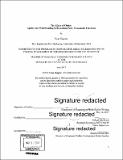| dc.contributor.advisor | Mikael Jakobsson. | en_US |
| dc.contributor.author | Higgins, Evan (Evan Lee) | en_US |
| dc.contributor.other | Massachusetts Institute of Technology. Department of Comparative Media Studies. | en_US |
| dc.date.accessioned | 2017-09-15T15:28:05Z | |
| dc.date.available | 2017-09-15T15:28:05Z | |
| dc.date.copyright | 2017 | en_US |
| dc.date.issued | 2017 | en_US |
| dc.identifier.uri | http://hdl.handle.net/1721.1/111300 | |
| dc.description | Thesis: S.M. in Comparative Media Studies, Massachusetts Institute of Technology, Department of Humanities, 2017. | en_US |
| dc.description | Cataloged from PDF version of thesis. | en_US |
| dc.description | Includes bibliographical references (pages 88-92). | en_US |
| dc.description.abstract | Agency is often taken as a given in branching-path stories because they, almost by definition, allow for enhanced user involvement. But this truism hasn't changed as the structure of the worlds that these branching texts exist within have. Transmedia, branching-path texts represent an intersection of both linear media and forking ones and thus, an interesting case study of how player agency can be expanded and re-categorized in these larger universe. By looking at where and how agency is located in three different case studies, we can get a better sense of how agency is changing-and staying the same-in these multi-platform, player-driven worlds. The first chapter in this thesis looks at the intersection of worldbuilding and transmedia and where player agency can hope to fit between these traditions. The second focuses on the Game of Thrones universe, looking to understand the effects that adding the branching-path Telltale game had on this universe. The third chapter looks to Mass Effect and all its related media in an effort to understand how an undefined hero ties the whole universe together. The fourth chapter focuses on Quantum Break, and its groundbreaking, wholly integrated, transmedia structure. The final chapter discusses steps creators in the future can take to expand player agency. By looking at these worlds through an increased understanding of where the player fits in, it becomes clearer how these universes can be expanded in the future while still giving the player the most autonomy over their story. | en_US |
| dc.description.statementofresponsibility | by Evan Higgins. | en_US |
| dc.format.extent | 92 pages | en_US |
| dc.language.iso | eng | en_US |
| dc.publisher | Massachusetts Institute of Technology | en_US |
| dc.rights | MIT theses are protected by copyright. They may be viewed, downloaded, or printed from this source but further reproduction or distribution in any format is prohibited without written permission. | en_US |
| dc.rights.uri | http://dspace.mit.edu/handle/1721.1/7582 | en_US |
| dc.subject | Humanities. | en_US |
| dc.subject | Comparative Media Studies. | en_US |
| dc.title | The allure of choice : agency and worldbuilding in branching-path, transmedia universes | en_US |
| dc.title.alternative | Agency and worldbuilding in branching-path, transmedia universes | en_US |
| dc.type | Thesis | en_US |
| dc.description.degree | S.M. in Comparative Media Studies | en_US |
| dc.contributor.department | Massachusetts Institute of Technology. Program in Comparative Media Studies/Writing | en_US |
| dc.identifier.oclc | 1003284370 | en_US |
